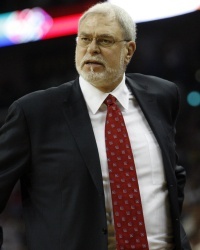c. 2008 Religion News Service
(UNDATED) It was the second game of the NBA finals on Sunday night (June 8) and Phil Jackson’s Los Angeles Lakers were losing badly.
A sideline reporter asked the veteran coach how his team could mount a comeback against the vaunted Boston Celtics.
“We’ll get into the game,” Jackson said, “by relaxing.”
There’s little stamping and shouting on the sidelines with Jackson. Instead, the serene 62-year-old looks like Buddha on the bench, calm as he watches the Lakers whittle down the Celtics’ lead.
It was vintage Jackson, whose success in the NBA is matched only by his unorthodox methods.
Weaving together his twin passions of spirituality and basketball, Jackson seems as interested in developing his players’ intellectual imaginations as he is in drawing up defenses.
He’s been known to give players books by Nietzsche and Langston Hughes. His teams don’t play seasons; they undertake “sacred quests.” Players practice Buddhist meditation before they practice jump shots. Jackson describes their signature offense as “five-man tai chi.” He summons his team to meetings by beating a Native American drum, and team rooms are decorated with Native American totems _ wooden arrows and bear claws _ rather than banners and trophies.
Yet Jackson has earned plenty of those, too. His nine championships _ six coaching the Chicago Bulls and three leading the Lakers _ ties an NBA coaching record. No coach has won a higher percentage of playoff and regular season games, and last year he was inducted into the basketball Hall of Fame.
This week, Jackson has his Lakers are in the NBA finals again.
The secret of his success?
“Meditation and cigars,” Jackson has joked with his friend, writer Charley Rosen.
He was jesting, partly.
While having players like Michael Jordan and Shaquille O’Neal on your team certainly helps win games, the coach credits spirituality with helping him mold egocentric superstars into an cohesive unit.
“I vowed to create an environment based on the principles of selflessness and compassion I’d learned as a Christian in my parents’ home; sitting on a cushion practicing Zen; and studying the teaching of the Lakota Sioux,” Jackson wrote in his 1995 memoir, “Sacred Hoops.”
Raised by two Rapture-ready, fire-and-brimstone Pentecostal parents in Montana and North Dakota, Jackson had a strict, if limiting, childhood.
After starring in basketball at college, however, he began to explore new horizons while playing for the New York Knicks, where he became known as the hippie rebel who backed up teammate (and future Sen.) Bill Bradley.
Rosen, a former pro-basketball player and current novelist, became Sancho Panza to Jackson’s Don Quixote.
“We were both searching for a spiritual path we could feel comfortable with,” Rosen said in an interview.
That path took Jackson to the Lakota Sioux, who adopted the lanky Westerner and dubbed him “Swift Eagle.” He also experimented with LSD and marijuana. Eventually, Jackson found his unique blend of myriad traditions; he now calls himself a “Zen Christian.”
“Merging Zen and Christianity allows me to reconnect with my spiritual core and begin to integrate my heart and mind,” Jackson writes.
While Christianity helps foster the compassion needed to care for 12 players, some of whom come from troubled homes, Zen meditation keeps his mind clear, flexible and focused on the present, Jackson says.
“One of Phil’s strength’s is player relationships,” Jordan once said. “He’ll call a lot on that Zen factor.”
The coach has even brought a meditation teacher, George Mumford, to teach the likes of Jordan and Kobe Bryant how to quiet the second-guessing, egocentric mind and go with the flow.
In a high-speed game like basketball, awareness is everything: stop to think and your man dunks on you. “I talk to them about being here now and strategies to return to the moment when they get distracted,” said Mumford, who said he spoke to the Lakers on Friday (June 6).
For all Jackson’s learning _ friend and author Jerry Lynch calls him a “voracious reader” _ the coach scoffs at his “Zen master” image.
“It’s so easy for the media to call me a `Zen master,”’ Jackson has said. “In truth, who I really am is a meditator whose sitting at the edge of the culture and looking in.”
He’s also sitting on top of the basketball world _ in the lotus position, no doubt.
KRE DS END BURKEPhotos of Phil Jackson are available via https://religionnews.com.





